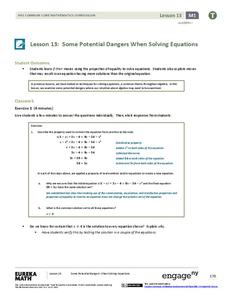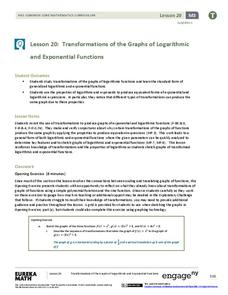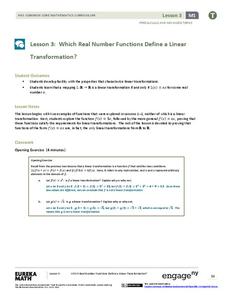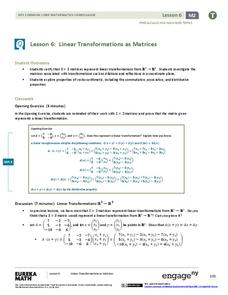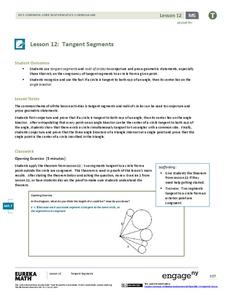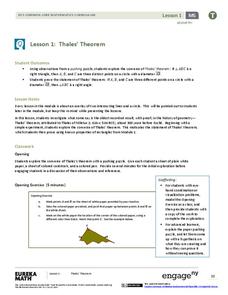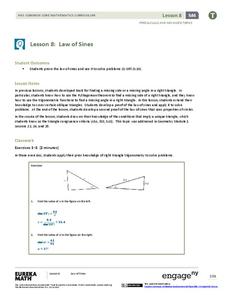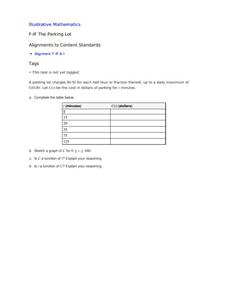Curated OER
Classifying Triangles Based On Properties of Angles
The interactive lesson featured here calls for the use of a Smartboard for sorting and classifying shapes. Then, pupils discuss the rules they followed for sorting their shapes, particularly focusing on the properties of angles. While...
Curated OER
Marshmallow Geometry
In this three-dimensional shapes geometry lesson, learners identify geometric solids and name their properties. They define "face," "edge," and "vertex," and construct geometric solids using marshmallows as vertices and toothpicks as edges.
EngageNY
Three-Dimensional Space
How do 2-D properties relate in 3-D? Lead the class in a discussion on how to draw and see relationships of lines and planes in three dimensions. The ability to see these relationships is critical to the further study of volume and...
EngageNY
Some Potential Dangers When Solving Equations
Need a less abstract approach to introducing extraneous solutions? This is it! Young mathematicians explore properties used to solve equations and determine which operations maintain the same solutions. They...
Willow Tree
Solving Inequalities
What does solving an inequality have in common with solving an equation? Almost everything! A math resource focuses on the one exception. The examples lead learners through the steps of solving an equality when multiplying or...
EngageNY
Transformations of the Graphs of Logarithmic and Exponential Functions
Transform your instructional activity on transformations. Scholars investigate transformations, with particular emphasis on translations and dilations of the graphs of logarithmic and exponential functions. As part of this investigation,...
EngageNY
Which Real Number Functions Define a Linear Transformation?
Not all linear functions are linear transformations, only those that go through the origin. The third lesson in the 32-part unit proves that linear transformations are of the form f(x) = ax. The lesson plan takes another look at examples...
West Contra Costa Unified School District
Divisibility Rules Justified
How do you know if a number is divisible? Instructors first prove the divisibility rules for three and four and then class members use this modeling to prove given divisibility rules for eight and nine either individually or in...
EngageNY
Graphing the Logarithmic Function
Teach collaboration and communication skills in addition to graphing logarithmic functions. Scholars in different groups graph different logarithmic functions by hand using provided coordinate points. These graphs provide the basis for...
EngageNY
Linear Transformations as Matrices
Don't stop with two-dimensional learning, go to the next dimension! Learners verify that 3x3 matrices represent linear transformations in the third dimension. Additionally, they verify the algebraic properties that extend to vector...
Curated OER
Order of Operations and Two-Step Equations
Solve two-step equations using order of operation in this algebra lesson. Young mathematicians evaluate functions through substitution and apply the properties of exponents and negatives correctly. They complete the order of operation...
EngageNY
Estimating Quantities
Apply the concept of magnitude to estimate values and compare numbers. The ninth activity of the 15-part series asks learners to write numbers to their next greatest power of 10 and then make comparisons. Scholars begin to understand the...
EngageNY
Multiplying and Dividing Expressions with Radicals
That's radical! Simplifying radicals may not be exciting, but it is an important skill. A math lesson plan provides explanations of properties used throughout the material. Scholars practice skills needed to multiply and divide...
EngageNY
Tangent Segments
What's so special about tangents? Learners first explore how if a circle is tangent to both rays of an angle, then its center is on the angle bisector. They then complete a set of exercises designed to explore further properties and...
EngageNY
Thales’ Theorem
Isn't paper pushing supposed to be boring? Learners attempt a paper-pushing puzzle to develop ideas about angles inscribed on a diameter of a circle. Learners then formalize Thales' theorem and use geometric properties to develop a proof...
EngageNY
The Graph of the Natural Logarithm Function
If two is company and three's a crowd, then what's e? Scholars observe how changes in the base affect the graph of a logarithmic function. They then graph the natural logarithm function and learn that all logarithmic functions can be...
EngageNY
Law of Sines
Prove the Law of Sines two ways. The ninth segment in a series of 16 introduces the Law of Sines to help the class find lengths of sides in oblique triangles. Pupils develop a proof of the Law of Sines by drawing an altitude and a second...
02 x 02 Worksheets
Dividing Polynomials Using Algebra Tiles
Discover how algebra tiles can help in dividing polynomials. Pupils watch as instructors demonstrate how to use algebra tiles to solve problems involving the division of a quadratic expression by a linear expression. Once they get the...
Curated OER
This House is Made of Mud: Exploring the Shapes in Our Lives
Learners study about our dependence on the earth's resources for materials. They practice their knowledge of geometric shapes by recognizing them in the context of the story.
Illustrative Mathematics
The Parking Lot
Use the real-world cost of parking a car to demonstrate the properties of a function. The resource describes to learners how much it is to park in a certain lot. It is up to your number crunchers to complete a table of minutes...
EngageNY
Solve for Unknown Angles—Transversals
Lead your class on an exciting journey through the world of math as they review geometry facts and solve for unknown angles. They learn how to use auxiliary lines and congruent angles to correctly complete each practice problem...
Mathematics Assessment Project
Applying Angle Theorems
Polygon ... an empty bird cage? After finding the angles of a polygon, young mathematicians use the provided methods to solve the problem in multiple ways.
EngageNY
The Power of Algebra—Finding Primes
Banks are responsible for keeping our financial information safe. Mathematics is what allows them to do just that! Pupils learn the math behind the cryptography that banks rely on. Using polynomial identities, learners reproduce the...
California Mathematics Project
Reflections
Reflections are the geometric mirror. Pupils explore this concept as they discover the properties of reflections. They focus on the coordinates of the reflections and look for patterns. This is the third lesson in a seven-part series.





